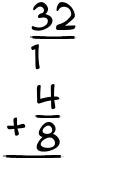What is 32/1 + 4/8?

|
This is how we add
|
|||||||||||||||||||||||||
Step 1Now we need to make our denominators match. 8 goes into 1 evenly, so we only need to multiply one term to get a common denominator. Multiply 32 by 8, and get 256, then we multiply 1 by 8 and get 8. This gives us a new problem that looks like so:
|
|||||||||||||||||||||||||
Step 2Since our denominators match, we can add the numerators. 256 + 4 = 260 So what's the answer so far?
|
|||||||||||||||||||||||||
Step 3Can this fraction be reduced? First, we attempt to divide it by 2... Are both the numerator and the denominator evenly divisible by 2? Yes! So we reduce it:
Let's try dividing by that again... Are both the numerator and the denominator evenly divisible by 2? Yes! So we reduce it:
Let's try dividing by that again... Nope! So now we try the next greatest prime number, 3... No good. 3 is larger than 2. So we're done reducing. There you have it! Here's the final answer to 32/1 + 4/8
|